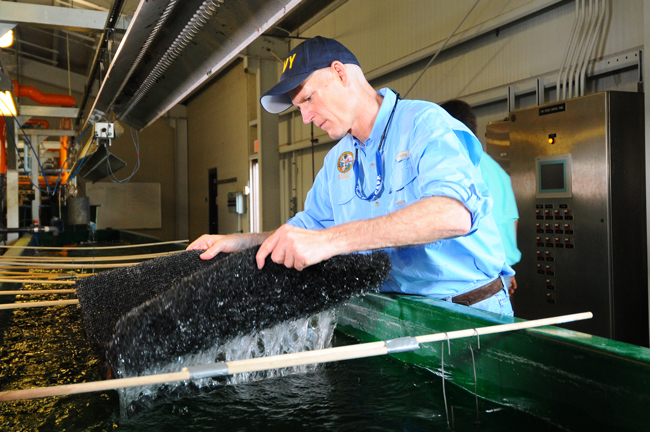
Before the legislative session began, with Gov. Rick Scott’s approval ratings refusing to budge from their relatively low position and his time to change his standing with the public fleeting, the governor took something of a gambit.
He would focus his energies on pushing two easy-to-define priorities through the Legislature: A pay raise for teachers and a sales-tax exemption for manufacturing equipment. If it worked, it would allow Scott to pocket two wins with a little more than a year to go before he asks voters for a second turn.
But there was a risk.
“I think any time a governor puts himself out on a line and says, ‘I have two things I want to accomplish,’ it’s pretty important that he accomplish those things to show people that he can lead,” said Sen. John Thrasher, R-St. Augustine.
In the end, Scott largely got what he wanted. The teacher pay raises will be structured a little differently from the $2,500, across-the-board boost that the governor envisioned. And the sales-tax exemption will begin in 2014 and sunset in three years, meaning that accomplishment could be wiped away if Scott is defeated next year.
But the takeaway for most Republicans, at least publicly, is simple: Scott got what he asked for.
“I think the governor gets two wins,” said Senate President Don Gaetz, R-Niceville. “I think it gives him a lift going into the summer and into the election cycle. And I’m for Rick Scott for governor, so I’m glad he got the wins.”
At the same time, Republican leaders said, the politics weren’t necessarily what drove them to back Scott.
“His priorities were good priorities,” said House Speaker Will Weatherford, R-Wesley Chapel.
“He wanted more money for education, which we gave him and, frankly, I think we would have done anyway, because we believe in investing in our education system,” Weatherford said. “But then his other priority was a tax cut. And we as conservative Republicans believe in cutting taxes.”
Though it might have seemed like it to anyone listening to his talks with reporters, Scott did not focus exclusively on his two priorities. There was other legislation that he was involved in, including the approval of an Everglades restoration plan that Scott helped negotiate, and bills moving through the process proved to be valuable leverage to help encourage lawmakers to accept the governor’s plans.
And one of Scott’s most dramatic turnabouts, endorsing Medicaid expansion after having waged a three-year-long political and legal battle against the federal health-care law known as Obamacare, was for naught. The Senate produced an alternative proposal to draw down federal funds, but the House refused to consider it in favor of a state-funded plan.
Democrats have seized on that and the differences between Scott and the Legislature on teacher pay to push back against the idea that Scott had a successful session.
“The nation’s most unpopular governor attempted to use the 2013 legislative session as an Extreme Makeover: Political Edition. … Rick Scott knows he’s in trouble, and voters see through his electioneering about-face,” said Max Steele, a spokesman for the Florida Democratic Party.
And even if Scott can make the case that he prevailed in the session, it’s not clear whether that will be reflected in the polls. A Quinnipiac University poll conducted in mid-March, at the height of Scott’s efforts to get voters to take another look at him, showed his approval rating mired at 36 percent, with 49 percent of those surveyed disapproving.
The poll showed Scott losing by double digits in hypothetical match-ups against former Gov. Charlie Crist, a Republican-turned-independent-turned-Democrat, and former Chief Financial Officer Alex Sink, Scott’s opponent in the 2010 election.
And this is not the first time Scott has gotten much of what he wanted from the House and Senate.
“He’s had successful sessions in the past and not seen a real jump in his numbers,” said Steve Schale, a Democratic political consultant.
Democrats instead say Scott should push harder on Medicaid expansion, by vetoing the budget or by calling a special session to force lawmakers to reconsider. Scott didn’t sound overly enthusiastic about the idea in the immediate aftermath of the session.
“Right now, the Legislature’s said ‘no,'” he told reporters Friday night.
But House Minority Leader Perry Thurston, D-Fort Lauderdale, said whether the governor’s session could be called a success depends on it.
“If he makes a move to really show that he’s in support of Floridians getting health care, and that it’s not just lip service, then he’ll have a good session,” Thurston said.
He acknowledged the skepticism among at least some observers that Scott would take either step in an effort to cause a confrontation.
“That’s what leadership does,” Thurston said. “And it’s time for him to lead.”
–Brandon Larrabee, News Service of Florida





























Sherry Epley says
Rick Scott needs to go. . . it’s as simple as that! We also need to implement the ability to “recall” an elected politician. If we had that option, we could have thrown him out of office in the beginning.
My two cents says
The sooner he leaves the better we all will be.